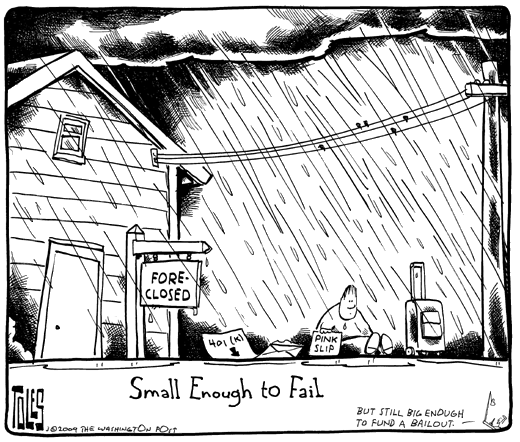( – promoted by buhdydharma )
Sure there are lots of big issues we can and need to talk about and debate when it comes to the economic crisis facing both this country and the rest of the globe. And it can feel like we’re pretty powerless to get our voices heard. But there’s one relatively small thing that’s happening where perhaps we can have some influence – especially when it comes to the thousands of people who are facing bankruptcy and the potential loss of their homes.
Recently the House passed a Banking Bill that contains a “cram-down provision” (where do they come up with these names?) In case you hadn’t heard, it would allow judges in bankruptcy court to force lenders to refinance mortgages so that people can lower their monthly payments and perhaps keep their homes. With all the crazy deals that were sold (oftentimes to uninformed borrowers) during the housing boom, this seems like a common-sense thing to do, wouldn’t you say?
Well, not to Sen. Evan Bayh and perhaps a few of his gang of 15 who seem determined to stop the Obama administration from passing any legislation that would ease the burden on people who are struggling.
Apparently that man of spine (cough, cough) Harry Reid is considering pulling the provision from the bill when it goes before the Senate because Bayh has joined with the Republicans in thinking the interests of the lenders are more important than people having a shot at keeping their homes.
Senate Majority Leader Reid said today he would drop a cram-down provision from a House-passed banking bill if the language threatened to keep the Senate from passing the overall bill. The provision would allow a bankruptcy judge to reduce a homeowner’s mortgage principal. “If we can’t get the votes for that, and I am hopeful we can — I am semiconfident we can — then what I’ll do is take that off [the bill] and do the other banking provisions,” Reid said at a Christian Science Monitor breakfast…
Bayh and Judiciary ranking member Arlen Specter are pushing an alternative bill that narrows the range of borrowers who could have their mortgage principal reduced. Lobbyists tracking efforts by Senate Majority Whip Durbin to drum up industry and Senate support for a measure like the House bill said talks appear stalled. Eliminating or watering down the cram-down provision would be a win for the banking industry and Sen. Bob Corker, R-Tenn., who has pushed to move banking provisions separately from the cram-down measure.

h/t to BlatantLiberal
So if you disagree with Bayh and think ordinary Americans deserve some bargaining room to try and keep their homes, why not think about letting him know that? Especially if you live in Indiana. And if you’re represented by one of the “gang of 15,” it might not be a bad idea to contact them and see where they stand on this.
Leading the new group are Democratic Sens. Evan Bayh of Indiana, Tom Carper of Delaware and Blanche Lincoln of Arkansas… [O]thers joining the group are Sens. Michael Bennet of Colorado, Mark Begich of Alaska, Kay Hagan of North Carolina, Herb Kohl of Wisconsin, Mary Landrieu of Louisiana, Joe Lieberman of Connecticut, Claire McCaskill of Missouri, Ben Nelson of Nebraska, Bill Nelson of Florida, Jeanne Shaheen of New Hampshire, Mark Udall of Colorado, and Mark Warner of Virginia.”
And while you’re at it, it might not hurt to let these folks know that in general, siding with the Republicans is not likely to be a smart move for their long-term career goals in the Senate.

19 comments
Skip to comment form
Author
for the Senate…one huge leap for the people who are trying to keep their homes.
cram it down your throat f’ing harry, huh?
How did a republican get to be Senate Majority Leader anyway?
Clare McCaskill really pisses me off as I donated to her campaign via Act Blue as she billed herself as not a conservative but a moderate this is not moderate. Jeanne Shaheen was on Rachael Maddow and she made no sense when explaining her opposition to Obama’s economic recovery program. She said that her opposition to the Global warming caps was because it would be to hard on the ‘heavy carbon economic dependent regions’ and raise the cost of energy.
This is something we can do. Pressure politically in a movement that is bottom up and demands ‘change’ we need.